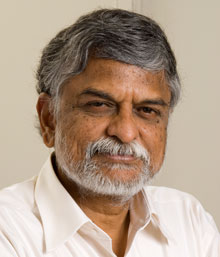  |
| HOME | THIS ISSUE | CALENDAR | GRANTS | BACK ISSUES | < BACK | NEXT > |
Expert on parasitic diseases named to international panelby Kristina Goodnough - September 17, 2007 | ||||
| Dr. T.V. Rajan, a professor of immunology at the Health Center, has been invited by the World Health Organization to serve a four-year term on its expert advisory panel on parasitic diseases. Rajan is an expert on the biology of human lymphatic filariasis, a parasitic disease that causes elephantiasis, a grotesque thickening and hardening of the skin. It is one of the leading causes of permanent and long-term disability in the world. While studying the disease, Rajan was puzzled why mice used in his research could rid themselves of the filariasis-causing parasite and avoid long-term illness, while millions of people in certain areas of the world suffered chronically from the disease. His hypothesis was that children born to women infected by the parasite during pregnancy were more likely to get the disease later in life. “Instead of developing protective antibodies to the illness, the child’s immune system does not recognize the mosquito-born parasite as a threat, and tolerates its presence,” says Rajan. That means the mother’s infectious status could help determine whether the children are more susceptible to the disease. The World Health Organization estimates that about one billion people in 80 countries are at risk of filariasis, which occurs most frequently in India and Africa. “This is a high point of my career,” says Rajan. “I come from India, where about 50 percent of the cases occur. My grandmother had the disease. I worked on this disease in the hopes that I could play a role in global eradication efforts. Now I believe I will have the opportunity to do that.”
Rajan is one of six members on the expert advisory panel on parasitic diseases. Two are from Asia, two from Africa, one from Europe, and one – Rajan – from the United States. “I didn’t solicit this,” he says, “it just happened.” As a member of the panel, Rajan will be involved in policymaking related to the allocation of resources to eliminate the disease. “Because of the work done in my laboratory over the past two decades, we now have the potential to predict whether a child one or two years old is likely to become infected,” he says. “This information means we don’t have to treat everyone. We can provide prophylactic measures just to those most at risk. The target population for those at risk of this disease is a billion people. With a fairly simple blood test, we can reduce that billion to a few million. That saves a lot of money for very poor countries.” Rajan joined the Health Center in 1988. He received his medical degree from the All India Institute of Medical Sciences and his Ph.D. from the Albert Einstein College of Medicine, Yeshiva University in New York City. |
| ADVANCE HOME UCONN HOME |

